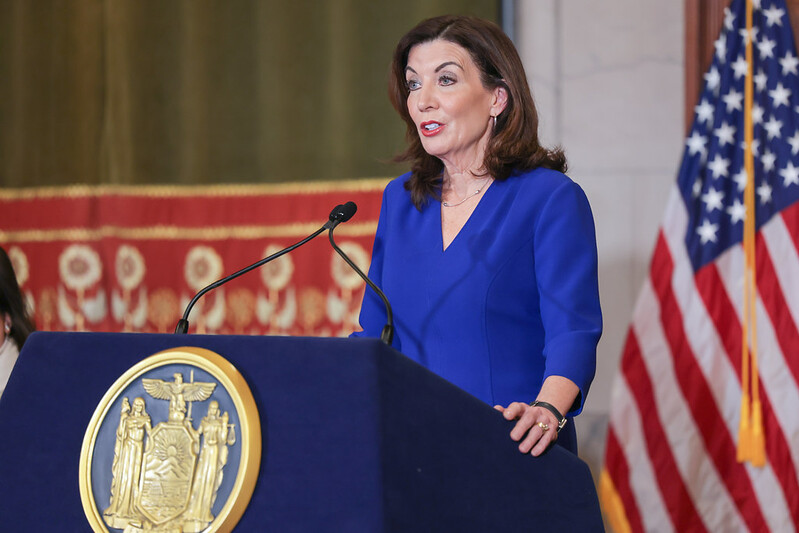Lawmakers in Albany Saturday passed a state budget for fiscal year 2023 that rolls back criminal justice reform measures, modestly expands Medicaid for certain undocumented immigrants, and expands funding for childcare.
This year’s $220 billion budget contains a number of controversial provisions, which are often inserted into state budgets at the last minute. For example, the budget also contains $600 million for the Buffalo Bills’ stadium — the largest public investment in an NFL team in history — after Gov. Kathy Hochul negotiated the deal.
The new budget allows judges to set cash bail for more types of cases, including certain types of theft and illegal firearm cases involving as few as three guns. It also gives prosecutors more leeway when handing over evidence to defense attorneys during trials.
Reforms passed in 2019 had previously prevented judges from setting bail for most misdemeanors and non-violent felony charges, and set strict requirements for evidence-sharing during the discovery process in criminal trials. Police and some members of the public blamed the reforms for an increase in street violence. However, a study by the city comptroller has shown that fewer than 1% of defendants released without bail are re-arrested on violent felony charges each month – suggesting that bail reform is not to blame for the increased violence.
Criminal justice reform advocates say the legislation will exacerbate the human-rights crisis on Rikers Island, where two inmates died in one week in March.
“Continuing to reinforce what has not worked is a travesty that that will negatively impact those already in hopeless situations and deplorable conditions in Rikers,” said Rev. Wendy Calderon-Payne, executive director of the Mott Haven-based organization Bronx Connect.
The budget contains $7 billion over four years for child care subsidies, which will go to parents and providers. Families earning up to 300% of the federal poverty level will be able to access subsidies (compared to just 200% before).
The new budget provides $1.1 billion in capital funding for the New York City Housing Authority (NYCHA), including $750 million in reappropriations for capital projects from prior budgets. It also provides an additional $800 million for the Emergency Rental Assistance Program, which previously ran out of money after providing $2.1 billion to tenants at risk of eviction.
The legislation does not contain an extension of the controversial 421-a tax subsidy for affordable housing, sometimes criticized as a boondoggle for developers, which is set to expire in June.
The budget contains some new funding for undocumented immigrants, but not as much as advocates hoped for. It does not contain any new funding for the Excluded Workers’ Fund, which provided relief to those ineligible for unemployment insurance due to their immigration status. It does, however, expand Medicaid coverage for undocumented mothers for up to 12 months after giving birth, and removes citizenship requirements for access to Medicaid for seniors over 65.
The New York Immigration Coalition, which advocates for expanding Medicaid eligibility to all undocumented New Yorkers, expressed support for the limited expansion, but called the new budget “far from a victory.”

